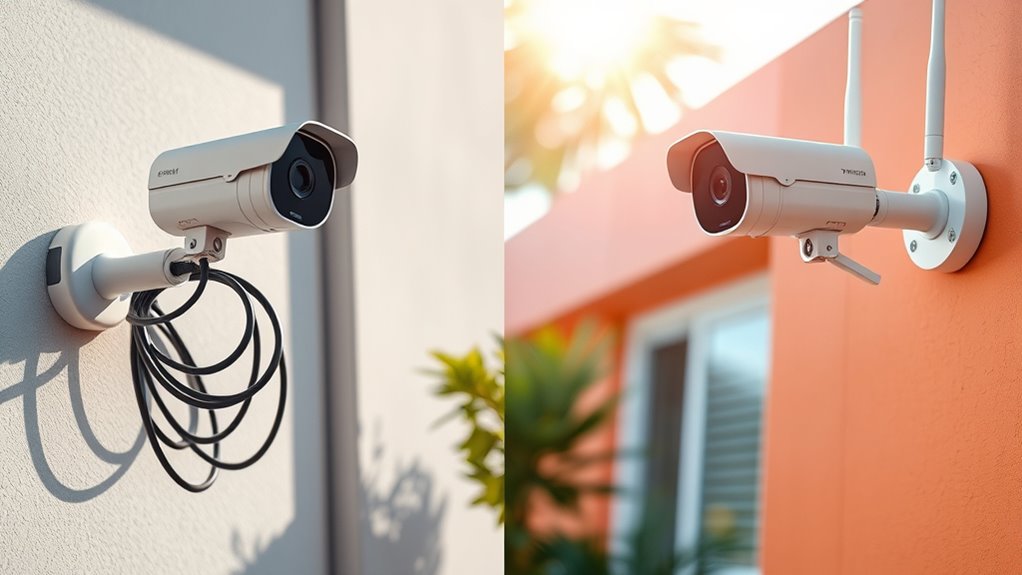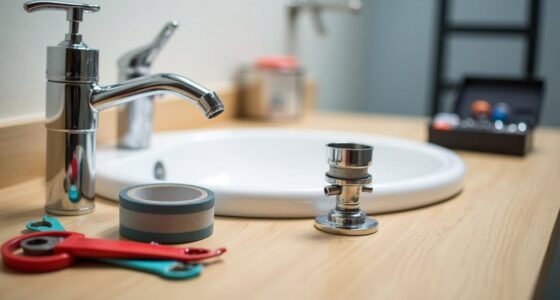When choosing between wired and wireless security cameras, consider installation and reliability. Wired systems offer enhanced reliability and consistent performance but can be tricky to install, often needing professional help. Wireless cameras provide quick, hassle-free setup and versatility in placement but may suffer from signal interference. Your decision should match your security needs and property layout. Keep exploring to discover more insights on which system suits you best.
Key Takeaways
- Wired security cameras require professional installation, with complex cable management, while wireless cameras offer quick and easy setups without wiring hassles.
- Wired systems provide consistent power and video quality, making them more reliable, whereas wireless systems may face signal degradation and cybersecurity risks.
- Wireless cameras allow for flexible placement and easy relocation, ideal for renters or temporary setups, compared to the fixed positioning of wired systems.
- Installation costs for wired systems can reach $2,000, while wireless options are budget-friendly with minimal maintenance requirements and ongoing battery replacements.
- Long-term reliability and reduced maintenance costs make wired systems favorable for permanent installations, while wireless systems excel in energy efficiency and adaptability.
Wired Security Cameras: Installation Process and Challenges
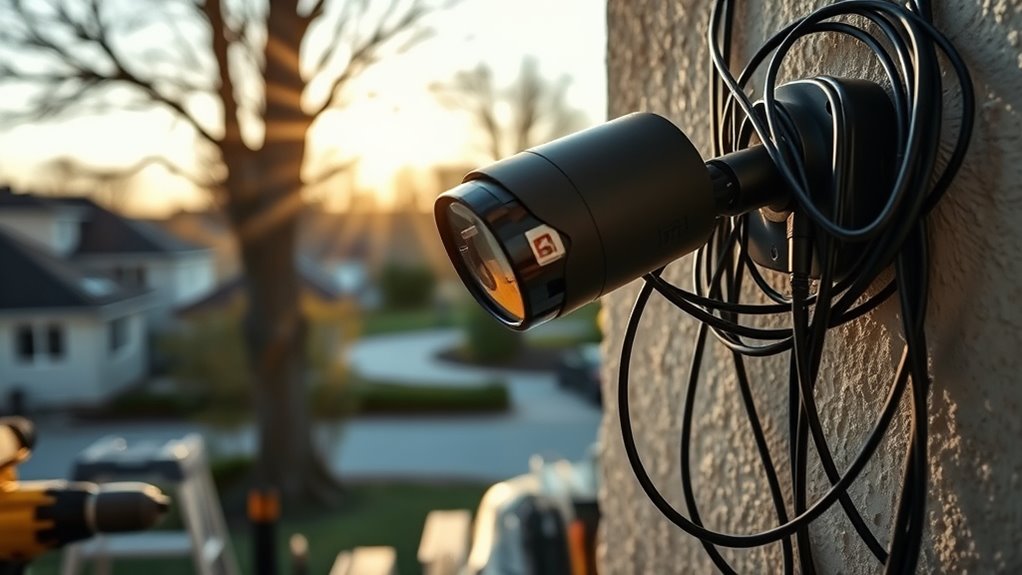
When considering wired security cameras, you should be prepared for a detailed installation process that can be both time-consuming and challenging. This involves running cables from each camera to a central hub, which may require professional installation, especially for larger properties. You’ll need to guarantee reliable power sources are available, as outlets mightn’t be conveniently located. Effective cable management is essential to hide and secure wiring, preserving the aesthetic appeal of your space while preventing tampering. Additionally, homes without security systems are 300% more likely to be burglarized, underscoring the importance of reliable security measures. Furthermore, wired systems often offer a smoother performance due to their consistent power supply.
Wired systems typically provide enhanced reliability compared to their wireless counterparts, making them a solid choice for comprehensive home security. Keep in mind that once installed, repositioning wired cameras is less flexible, as you’d need to re-run cables and potentially modify existing infrastructure. As a result, weigh these challenges against the reliability that wired systems offer when making your decision. Additionally, consider how the charging contacts can impact device performance, especially in outdoor setups. Understanding the financial considerations related to security system installation can also help you plan effectively.
Wireless Security Cameras: Easy Setup and Flexibility

Wireless security cameras make setup a breeze, letting you install them in just minutes without the hassle of wiring. You can place them almost anywhere, even in spots without power, thanks to battery or solar options. Additionally, heat pumps can significantly lower carbon emissions compared to traditional heating systems, making them an eco-friendly choice for homes. Furthermore, the advanced safety features in modern technology help ensure that your security system remains reliable and efficient. Proper installation techniques can also enhance the effectiveness of your wireless cameras, providing optimal coverage and performance. Moreover, these cameras can be integrated with renewable energy systems, further enhancing their sustainability and operational efficiency.
Plus, their portability means you can easily move them around as your monitoring needs change. Additionally, their high refresh rates enhance real-time monitoring and responsiveness, making them a reliable choice for security applications.
Quick Installation Process
Installing wireless security cameras is a breeze, making them perfect for anyone who wants a hassle-free setup.
These cameras offer a quick installation process that supports DIY enthusiasts by eliminating wiring.
Here are three key advantages:
- Battery-Powered Cameras: You can install them in locations without electrical access, drastically reducing installation time. This is especially beneficial in areas where high suction power is required for optimal performance, similar to how vacuum cleaners operate. Additionally, these cameras often require minimal maintenance compared to wired options, making them even more convenient. Regular use of these cameras can contribute to improved indoor air quality, particularly in homes with pets or allergens. Moreover, many modern battery-powered cameras are designed with safety features to ensure reliable operation.
- User-Friendly Apps: Most systems come with easy installation apps, allowing you to configure and manage your cameras within minutes.
- Flexible Placement: You aren’t restricted by power outlets or cables, making it simple to relocate cameras as your security needs change.
Additionally, wireless cameras often feature energy efficiency that can help reduce long-term operational costs.
With wireless security cameras, you’ll enjoy a seamless setup and the ability to adapt your security system effortlessly.
Flexible Camera Placement
The ease of setup with wireless security cameras naturally leads to their flexible placement options. You can quickly install these cameras in various locations without the hassle of wiring, allowing for adaptable camera placement to suit your security needs.
If your monitoring requirements change, simply relocate the cameras as needed. Many wireless models run on battery power or solar energy, so you won’t be restricted by nearby electrical outlets. Additionally, tuning enthusiasts often appreciate the ability to integrate technology seamlessly into their setups, similar to how they enhance performance in vehicles. This flexibility can be compared to the way NLP enhances customer interactions, as both prioritize user convenience and adaptability. Furthermore, heat pumps filter and circulate indoor air, which can similarly enhance your overall living environment while ensuring security. Engaging in physical activity can also improve cognitive skills and decision-making, which is essential for effectively monitoring and responding to security events.
This versatility enables you to mount cameras at different heights and angles, providing a wide range of monitoring options for both indoor and outdoor environments.
With wireless systems, you can easily adjust your setup, making them ideal for renters or anyone needing temporary security solutions. Additionally, solar energy can enhance the sustainability of your security system, allowing for more eco-friendly options.
Portable Deployment Options
When you need quick security solutions, portable deployment options with wireless security cameras shine. These cameras offer effortless installation, making them ideal for various situations where flexibility is essential.
Here are three benefits of wireless security cameras:
- Battery Powered: You can place them anywhere, even without electrical outlets, ensuring reliable connection and security coverage. Additionally, regular maintenance of your security devices, much like air purifier maintenance, is crucial for optimal performance. Wireless cameras can also provide flexible placement options to adapt to changing security needs. Furthermore, just as fresh orange juice has a limited shelf life, the battery life of wireless cameras should be monitored regularly to ensure they remain functional.
- Easy Relocation: If your security needs change, you can quickly adjust their placement for best monitoring.
- Motion Sensors: Many models come equipped with these sensors, helping conserve battery life while maintaining effective surveillance.
Additionally, many wireless systems can offer monthly monitoring fees that make them cost-effective for various budgets. Whether for temporary setups at events or adapting your home security, wireless security cameras provide the versatility you need to stay protected.
Comparing Reliability: Wired vs. Wireless Connections
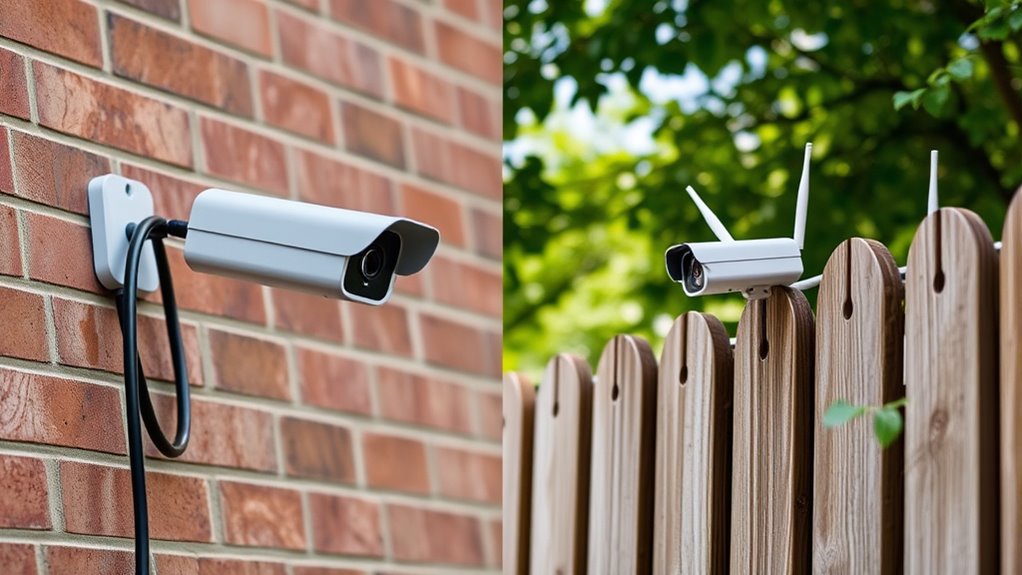
When it comes to reliability, wired security cameras often outshine their wireless counterparts.
With a direct connection, wired systems provide stable video transmission, while wireless cameras can suffer from signal interference and network issues.
Understanding these factors is essential for ensuring your surveillance setup meets your needs.
Connection Stability Factors
While choosing between wired and wireless security cameras, connection stability plays an essential role in ensuring reliable surveillance. Here are key factors to evaluate:
- Wired systems offer superior connection stability, maintaining video quality without interruption, even during internet outages.
- Wireless security cameras, relying on Wi-Fi connectivity, may suffer from signal degradation due to distance, physical barriers, or network congestion, risking gaps in footage.
- Cybersecurity is also a concern; wired options present a lower risk of unauthorized access compared to wireless systems that need constant internet connectivity for operation.
Ultimately, your choice will depend on the importance of uninterrupted surveillance and the installation environment.
Prioritizing connection stability can greatly enhance your security setup.
Signal Interference Issues
Connection stability is just one part of the equation; signal interference issues greatly impact the reliability of security cameras. Wired security cameras offer a direct connection that’s immune to signal interference, ensuring stable and reliable video feeds. In contrast, wireless security cameras rely on Wi-Fi signals, making them vulnerable to disruptions from competing devices and physical obstructions. This can lead to lower resolution and lag in video transmission, ultimately compromising surveillance effectiveness. Additionally, wired systems remain functional during power outages, while wireless options might fail if batteries deplete.
| Wired Security Cameras | Wireless Security Cameras |
|---|---|
| Immune to signal interference | Susceptible to interference |
| Consistent video quality | May experience lag |
| Functional during outages | Depends on battery/power |
Long-term Considerations for Installation
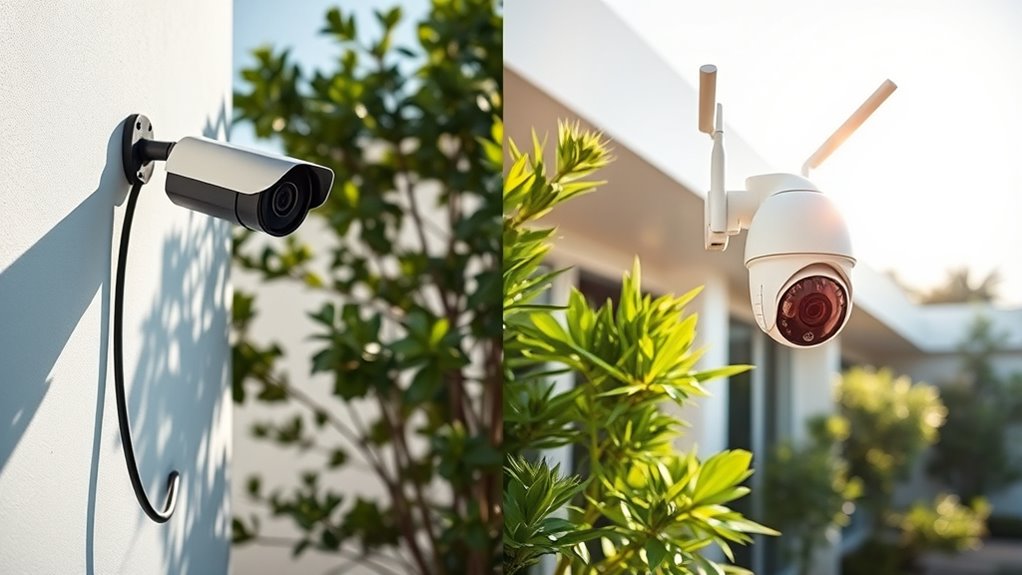
As you plan for long-term security, considering the installation type is essential. Here are three key factors to keep in mind:
- Reliability: Wired security cameras provide a stable connection, unaffected by Wi-Fi signal issues, making them ideal for long-term setups.
- Flexibility: Wireless security cameras offer easier relocation and installation, perfect for renters or temporary setups, but their reliability hinges on strong Wi-Fi signals and battery monitoring.
- Installation Complexity: Wired systems usually require professional installation, which can be costly and time-consuming, while wireless setups allow for simpler DIY installation.
Homeowners should weigh these factors based on their future plans, as wired systems are more permanent, while wireless options may better accommodate changes.
Cost Implications of Installation Choices
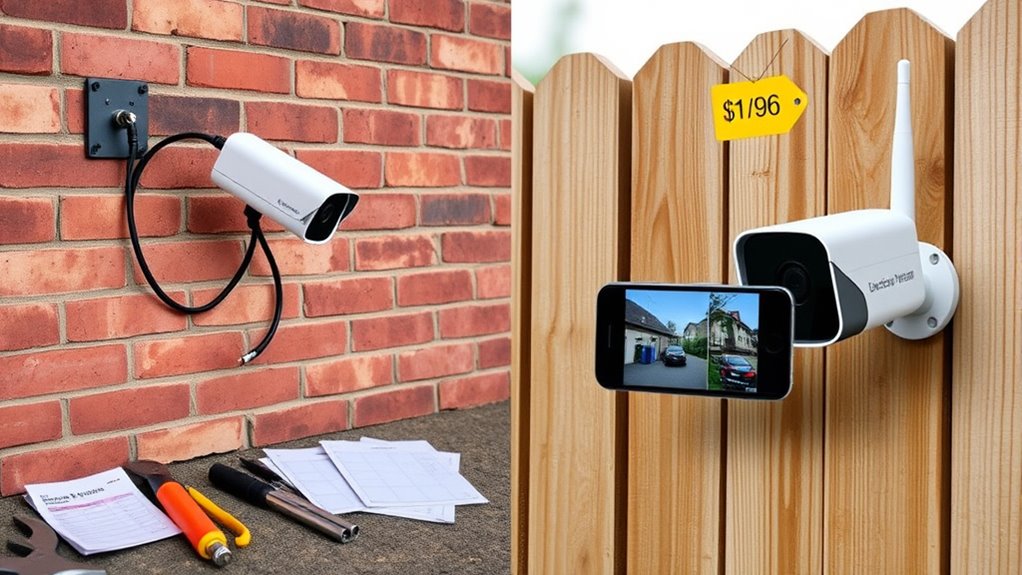
Choosing between wired and wireless security cameras can greatly impact your budget, especially when considering installation costs. Wired security systems often require professional installation, costing up to $2,000 for four cameras. In contrast, wireless security cameras offer a budget-friendly option since you can set them up quickly without extensive wiring. However, keep in mind the ongoing expenses like battery replacements. The long-term reliability of wired systems can lower maintenance costs, as they face fewer connectivity issues. Additionally, property size plays a role; larger properties may incur higher installation costs for wired options due to labor and materials.
| System Type | Initial Costs | Ongoing Expenses |
|---|---|---|
| Wired Security | Up to $2,000 | Lower maintenance |
| Wireless Cameras | Budget-friendly | Battery replacements |
| Connectivity issues | ||
Evaluating Security Needs: Which System Is Right for You?

How do you decide between wired and wireless security cameras for your property? Start by evaluating your unique security needs and preferences. Consider these factors:
Evaluate your unique security needs and preferences when choosing between wired and wireless security cameras for your property.
- Property Layout: Larger properties may benefit from wired systems, as they support extensive setups, while smaller spaces might work well with wireless options.
- Installation Approach: Think about whether you prefer professional installation with wired cameras or the DIY flexibility of wireless systems.
- Connectivity and Reliability: Wired systems offer stable connections, ideal for continuous monitoring, while wireless options depend on Wi-Fi quality and require strong cybersecurity measures.
Ultimately, your long-term plans will also influence your choice. If you’re renting or may relocate, wireless might be the better fit for your home security system.
Frequently Asked Questions
Is It Better to Have Wired or Wireless Security Cameras?
When deciding between wired and wireless security cameras, consider your specific needs.
If you want reliable connectivity and higher video quality, wired might be your best bet.
However, if flexibility and ease of installation are priorities, wireless could work better for you.
Think about where you’ll place the cameras and whether you need a permanent setup or something more temporary.
Ultimately, it boils down to your lifestyle and security requirements.
What Are the Disadvantages of Wired Cameras?
Did you know that about 40% of wired camera installations require professional help?
One major disadvantage of wired cameras is their complex installation process; it often involves extensive cable management and can take hours to set up.
Once installed, you can’t easily relocate them, limiting your options. Plus, they depend on a constant power source, risking downtime during outages unless you have backup solutions.
Also, they may lack modern features found in newer systems.
How Long Do Wired Security Cameras Last?
Wired security cameras typically last between 5 to 10 years, depending on their quality and the environment they’re in.
If you install and maintain them properly, they can even work reliably during power outages when connected to a backup power source.
Plus, their hardwired connections make them less prone to technological issues, providing consistent performance over time.
Regular updates can further enhance their longevity and security features, ensuring you get the most out of your investment.
Does Wired or Wireless Have Better Security?
Isn’t it ironic how you might think wireless cameras offer freedom, yet they’re often more vulnerable?
When it comes to security, wired cameras shine. Their direct connections keep your footage safe from hacking and network failures.
You won’t have to worry about losing video quality during an outage, either. If you value reliability and want to minimize tampering risks, wired systems are the way to go, ensuring your surveillance stays secure and uninterrupted.
Conclusion
When choosing between wired and wireless security cameras, consider your needs. If you value stability, wired systems offer consistent connections. If you prioritize flexibility, wireless options provide easy installation. For long-term reliability, think about your environment and potential obstacles. Ultimately, weigh installation ease against cost and your security goals. Each choice has its benefits, but your unique situation will guide you to the right decision. Trust your instincts, assess your needs, and secure your peace of mind.
